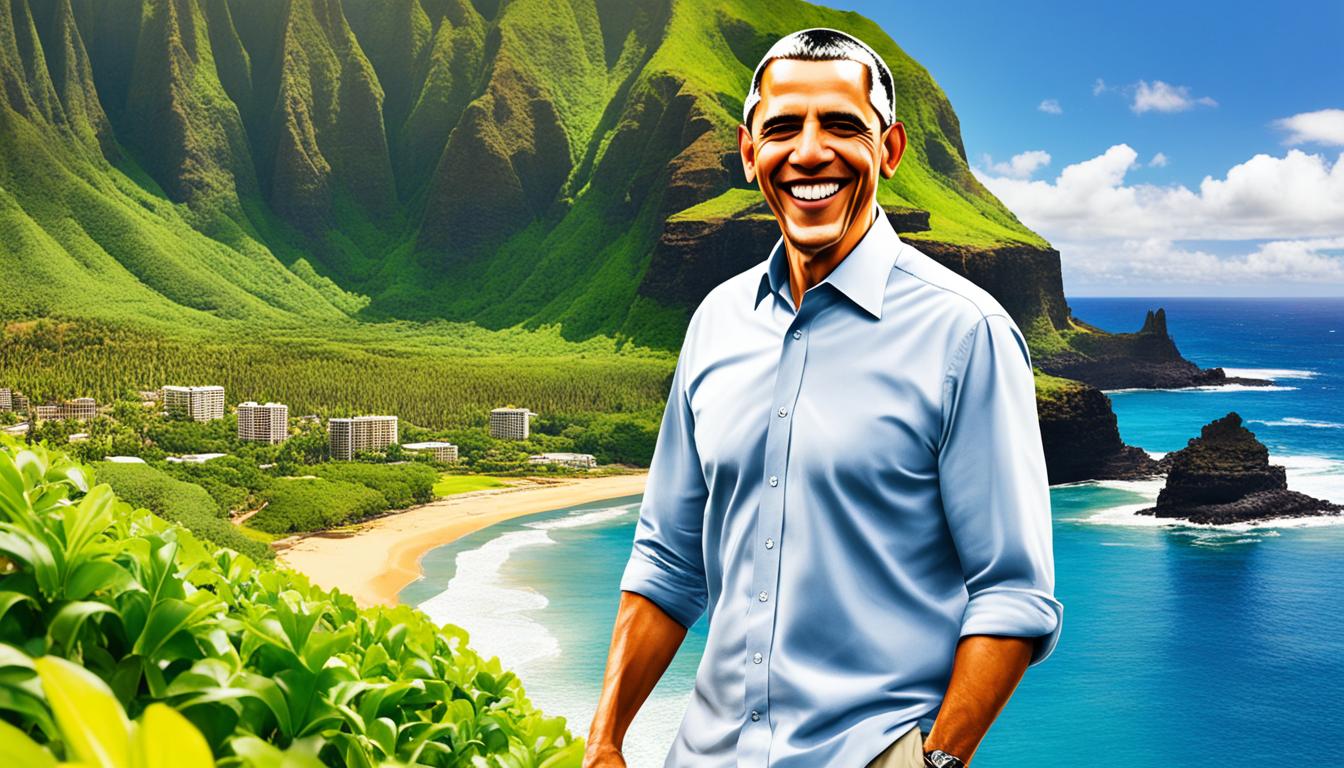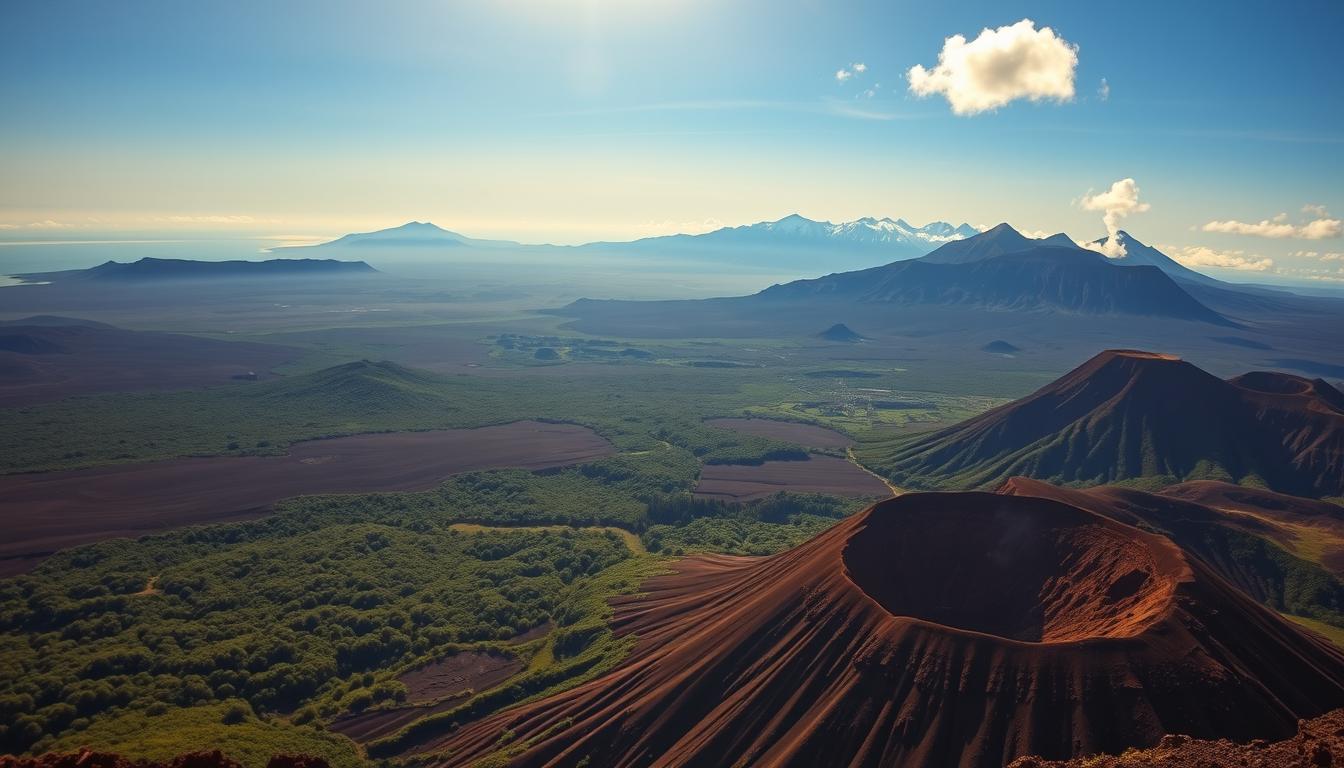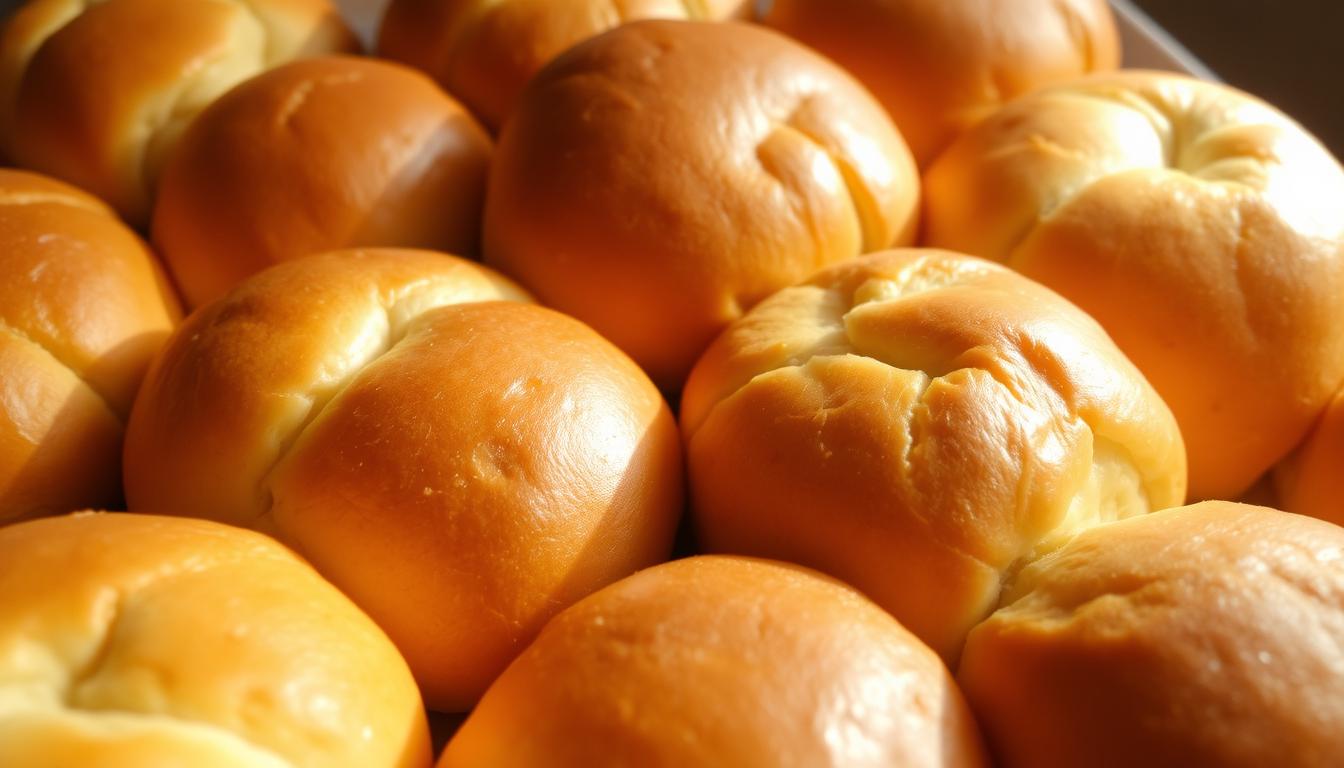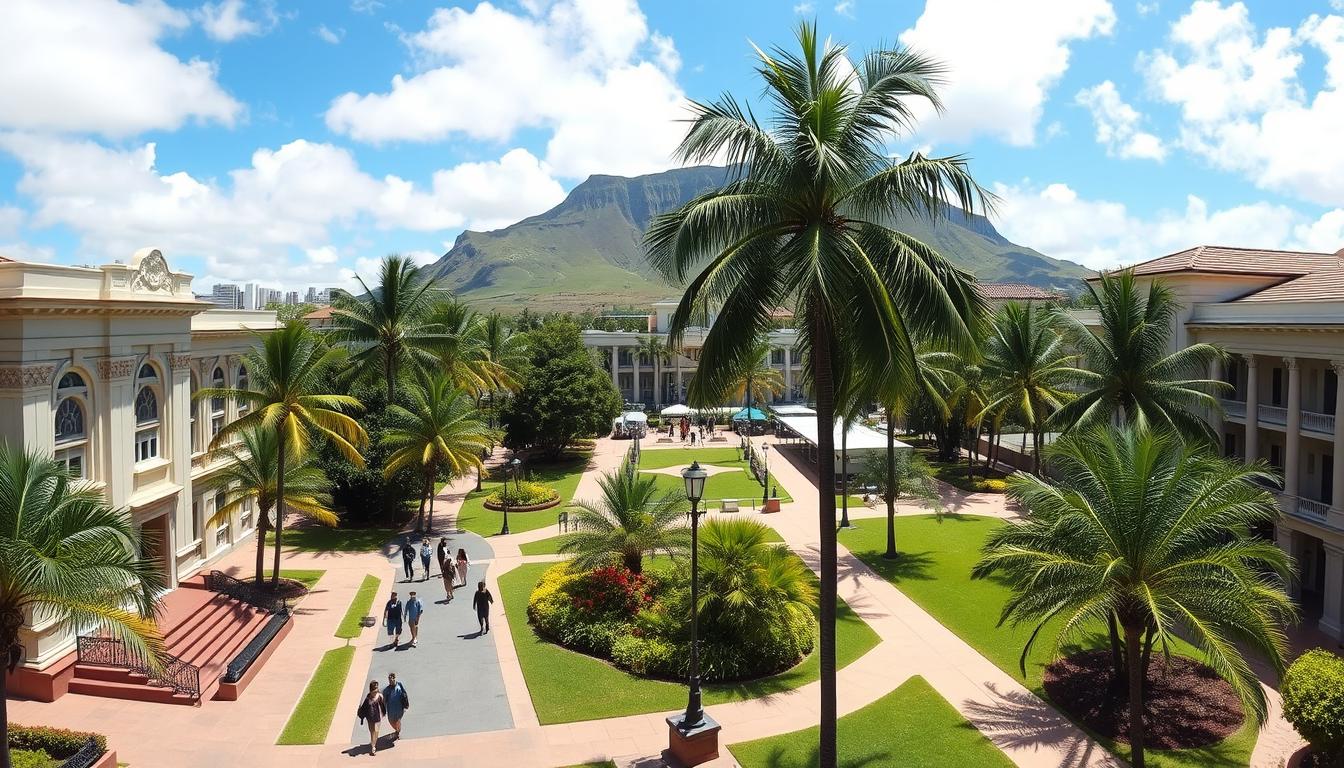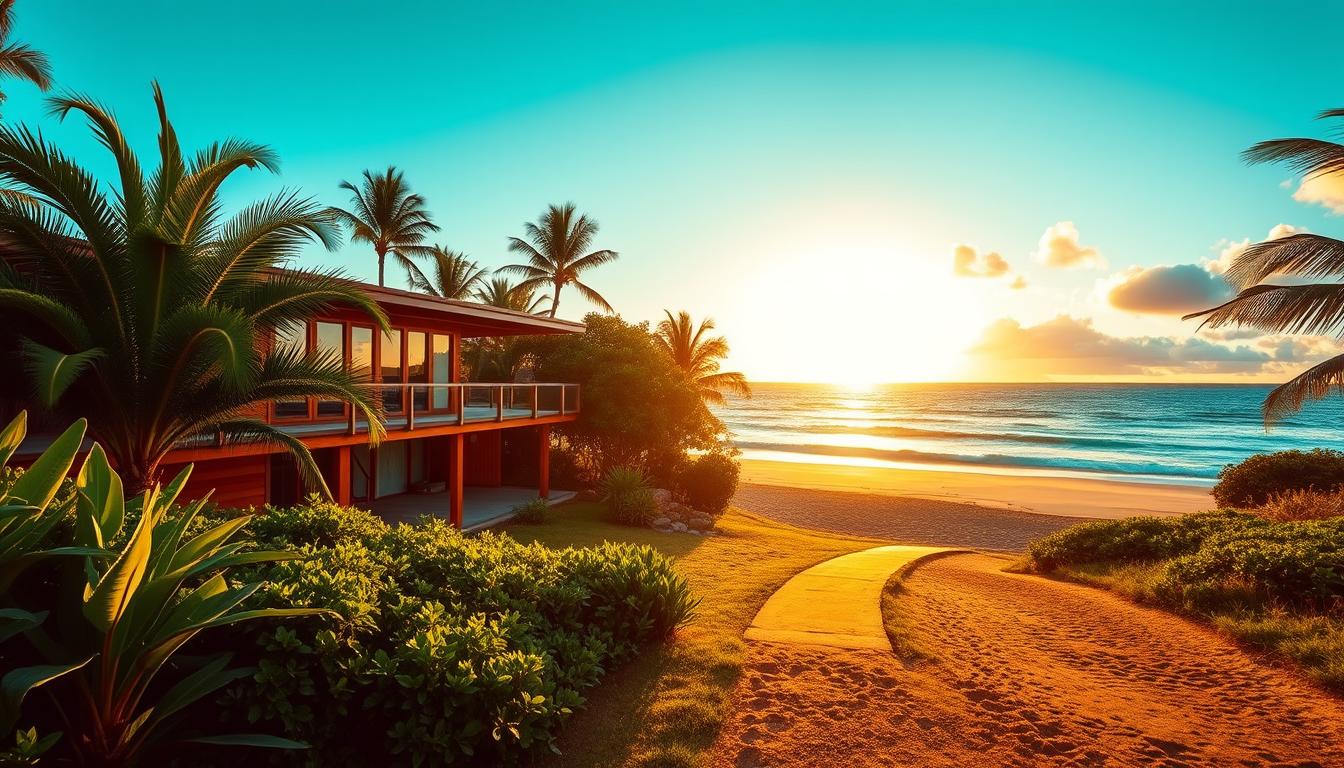Barack Obama, the 44th President of the United States, was born in Honolulu, Hawaii, in 1961. His early life in Hawaii was a key part of his story. It became important during his historic presidency as the first African American leader.
Obama’s mixed race and Hawaii’s diverse culture deeply influenced him. They shaped his values and how he led the country.
Hawaii’s mix of cultures and the idea of a “racial paradise” deeply affected Obama as a young man. Being “hapa” (mixed race) in Hawaii was complex. It helped shape his dream of a fairer society.
The Multicultural Melting Pot of Hawaii
Hawaii is often called a “racial paradise” because different cultures live together in harmony. This idea came from white missionaries and sociologists in the early 1900s. They wanted to show Hawaii as a place where races get along well, even though the U.S. took over the Hawaiian Kingdom.
Hawaii’s Ethnic Diversity and Inclusivity
Now, Hawaii is the most diverse state by race and ethnicity. Many families are mixed, and the term “hapa” describes people with mixed backgrounds. The large Asian population, brought in as laborers for sugar plantations, has blended into American life. This has helped make Hawaii known as a place where cultures mix well.
| Racial/Ethnic Group | Percentage of Hawaii’s Population |
|---|---|
| Asian | 37.6% |
| White | 24.7% |
| Native Hawaiian and Other Pacific Islander | 10.1% |
| Two or More Races | 23.6% |
| Hispanic or Latino | 10.1% |
Hawaii’s mix of cultures and welcoming nature is clear. But the idea of a “racial paradise” hides the hard parts of living in a diverse place. Next, we’ll look closer at this idea and its effects on Hawaii’s history and politics.
Obama’s Early Years in the Aloha State
Barack Obama spent his early years in Hawaii, a place full of different cultures. After his parents split, he moved to live with his white grandparents in Honolulu. There, he became part of a diverse community and learned about the island’s rich culture.
A Biracial Upbringing in Honolulu
Being biracial, Obama felt like a “hapa” – part Hawaiian, part African American. This mix of heritage shaped his early life. He learned to blend his African American roots with the Asian and Pacific Islander culture around him in Honolulu.
Attending Punahou School as a “Hapa”
Obama went to Punahou School on a scholarship. There, he was known as “Barry.” He loved playing basketball and making friends with people from different backgrounds. This experience taught him about being inclusive and connecting with others.
His time in Hawaii, surrounded by diverse cultures, prepared him for his future. The “Aloha spirit” he grew up with helped him become a leader who brings people together.
The Formative Experiences that Shaped Obama
Barack Obama grew up in Hawaii, a place full of different cultures. This shaped his view of the world and his leadership style. He learned to get along with people from various backgrounds, a skill he used in his career.
Navigating Diverse Cultures and Communities
Being in Hawaii, Obama saw many different perspectives. As a mixed-race kid, he faced challenges that taught him a lot. He learned to understand others and find common ground.
This helped him see things from other people’s viewpoints. Obama’s time in Hawaii made him value diversity. He became known for his ability to bring people together.
The “Aloha Spirit” of Hawaii taught him about respect and harmony. This idea of getting along with others helped shape his leadership. He aimed to unite people, even when they disagreed.
| Key Formative Experiences in Hawaii | Impact on Obama’s Leadership |
|---|---|
| Exposure to diverse cultures and ethnicities | Developed empathy, sensitivity, and an inclusive approach |
| Navigating the challenges of a biracial upbringing | Learned to bridge divides and find common ground |
| Embracing the “Aloha Spirit” of cooperation and harmony | Cultivated a unifying vision and leadership style |
Obama’s time in Hawaii was key to his later success. The diverse cultures and communities he encountered helped him unite people. He was able to make lasting changes thanks to these experiences.
obama history hawaii
Barack Obama’s roots in Hawaii were key to his growth. He was born to a Kenyan father and an American mother. This background and his time in Hawaii deeply shaped his values and leadership.
In Honolulu, Obama learned about the diverse culture of Hawaii. He found pride in his mixed-race heritage and the Aloha spirit. He went to Punahou School and explored Hawaii’s history and traditions.
This shaped his worldview and leadership style. Obama gained a strong love for diversity and community in Hawaii. These values guided him as a community organizer in Chicago and later as the first African-American president.
| Key Moments in Obama’s Hawaiian History | Impact on His Life and Presidency |
|---|---|
| Biracial Upbringing in Honolulu | Fostered a nuanced understanding of racial and cultural dynamics |
| Attendance at Punahou School | Exposure to Hawaii’s diverse educational environment |
| Immersion in Hawaiian Traditions and Culture | Developed a deep appreciation for inclusivity and the “Aloha Spirit” |
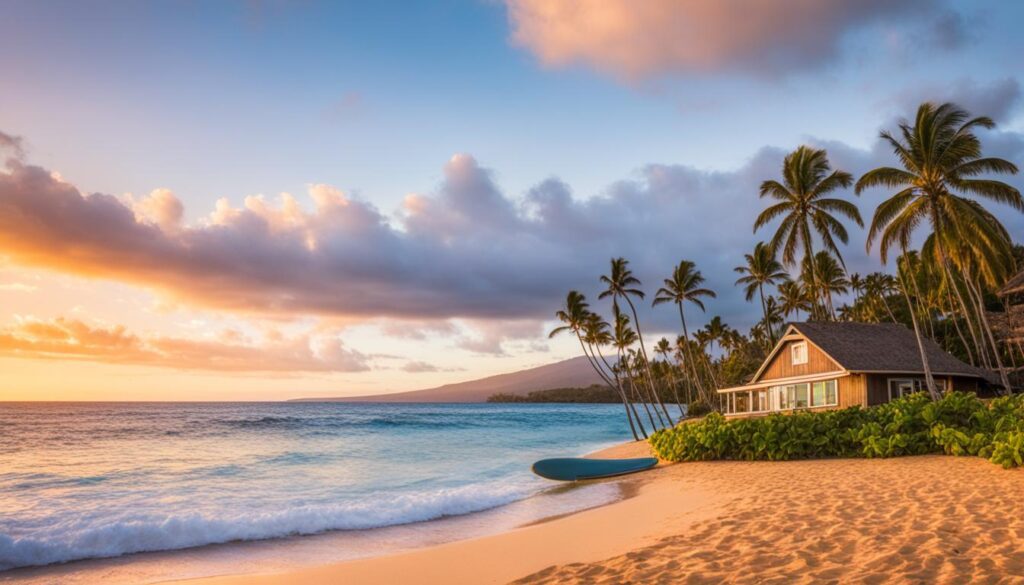
Obama’s time in Hawaii deeply influenced him. His experiences there shaped his identity and his commitment to community and inclusivity. The spirit of Hawaii is seen in his personal and political life.
Hawaii’s Role in Obama’s Path to Presidency
Barack Obama’s journey to the presidency was deeply shaped by his time in Hawaii. After leaving Hawaii for college and law school, Obama started a career in Chicago’s South Side. He worked to improve life in public housing projects. These efforts were built on the values and skills he learned in Hawaii.
This work was a key step towards his political career and the presidency.
Community Organizing in Chicago’s South Side
In the mid-1980s, Obama aimed to make a difference in Chicago’s underserved areas. He worked hard, organizing public housing residents to fight issues like crime, joblessness, and poor living conditions. This work sharpened his skills in building consensus and solving complex social problems.
Obama’s work in Chicago showed the values he learned in Hawaii. He could listen, work with others, and unite different groups. These skills helped him in his political career, leading him to the presidency.
The lessons Obama learned in Hawaii were crucial. They taught him about inclusivity, solving problems together, and tackling social issues at their roots. His time in Chicago made him more dedicated to public service. It also set the stage for his incredible rise to the presidency.
The “Aloha Spirit” in Obama’s Governing Style
Barack Obama learned how to bring people together in Hawaii. This was thanks to the “aloha spirit” he grew up with. He used this spirit to make decisions in the White House.
The aloha spirit means being warm, respectful, and welcoming. Obama used these values in his leadership. He worked to unite people, even those who disagreed with him.
Obama’s time in Hawaii taught him the value of community and working together. He applied this in the White House, aiming for bipartisan solutions. The “aloha spirit” made him open-minded and focused on the common good.
| Characteristic | Obama’s Governing Style | Traditional Aloha Spirit |
|---|---|---|
| Approach to Differences | Sought compromise and dialogue | Emphasizes respect and inclusivity |
| Focus | Finding common ground | Promoting harmony and community |
| Worldview | Multicultural and collaborative | Embracing diversity and interconnectedness |
Obama’s time in Hawaii deeply influenced his leadership. He used the values of his childhood to lead effectively. This made him stand out in politics, promoting cooperation and understanding.
Hawaii’s Bid for the Obama Presidential Library
Hawaii is stepping up to be a top contender for the Obama Presidential Library. It believes its rich history and culture of acceptance match Obama’s vision. This makes Hawaii a perfect spot for the library.
Leveraging the Racial Paradise Narrative
Hawaii is known as a place where different cultures live together well. Supporters of Hawaii’s bid think this story of unity fits well with Obama’s legacy. They see the library in Hawaii as a symbol of bringing people together and solving big problems.
The library could be a center for research and discussion. It would use Hawaii’s diverse communities to tackle issues like racial fairness, immigration, and the environment. By using Hawaii’s image as a “racial paradise,” the state hopes to show how Obama’s ideas can come to life.
But, some question Hawaii’s perfect image, pointing out ongoing issues like inequality and the effects of colonialism. As the fight for the Obama Library grows, Hawaii must deal with these challenges to prove it’s the right place for this important center.
The Enduring Legacy of Obama’s Hawaiian Roots
Barack Obama’s deep connection to Hawaii has greatly influenced his leadership. His time in the “Aloha State” shaped him into a trailblazing president. The multicultural openness and “aloha spirit” of his upbringing helped him tackle complex issues.
Obama’s leadership style and vision were deeply influenced by Hawaii. He learned the importance of diversity, community, and inclusivity there. These values helped him bridge divides and inspire hope across the nation.
| Key Aspects of Obama’s Hawaiian Legacy | Impact on His Presidency |
|---|---|
| Multicultural Upbringing | Ability to navigate diverse communities and perspectives |
| “Aloha Spirit” of Inclusivity | Promotion of national unity and bipartisanship |
| Appreciation for Diversity and Equity | Advancement of progressive policies and social justice |
As the first African American president, Obama’s roots in Hawaii challenged the idea of the state as a racial paradise. His mixed-race identity showed the complex reality of race in the U.S. By embracing his heritage, Obama helped us understand Hawaii’s diversity and the need for equity.
Obama’s legacy shows how his Hawaiian upbringing influenced his presidency. He celebrated diversity, fostered unity, and challenged the status quo. His “aloha spirit” remains a model for leadership and social progress as we face ongoing issues of racism and division.
Challenging the Myth of Hawaii as a Racial Utopia
Hawaii is often seen as a “racial paradise,” but this view is too simple. The idea of racial peace has been used for political and economic gains. This ignores the struggles of Hawaii’s native people. As the fight for the Obama Presidential Library grows, we must look closely at this story.
Hawaii is indeed diverse, but calling it a racial utopia hides the problems many face. The native Hawaiians have faced displacement, cultural loss, and economic struggles for centuries. These issues are often ignored by the image of racial peace. With the Obama Library on the line, it’s vital to share the real stories of Hawaii’s people.
The myth of Hawaii as a racial paradise is powerful but needs closer look. By understanding the complex history of its people, we can see Hawaii’s true past and present. This leads to a more inclusive and fair future for everyone.

Scott Sweeney is the creator of Virtual Hawaii 360. Scott is a professional marketer and a lifelong Hawaii enthusiast. Scott splits time between Oahu and Dayton, Ohio. In addition to his marketing endevours, he is also a published Ukulele musician.

